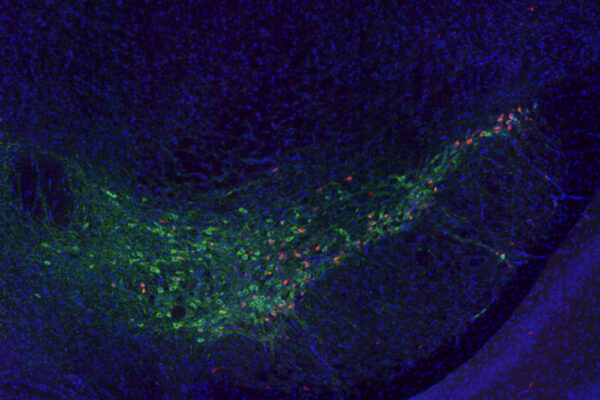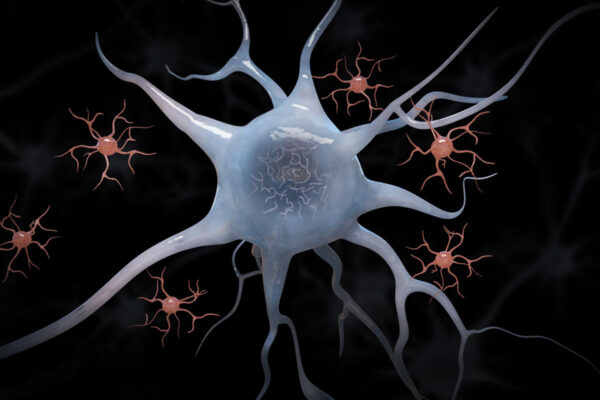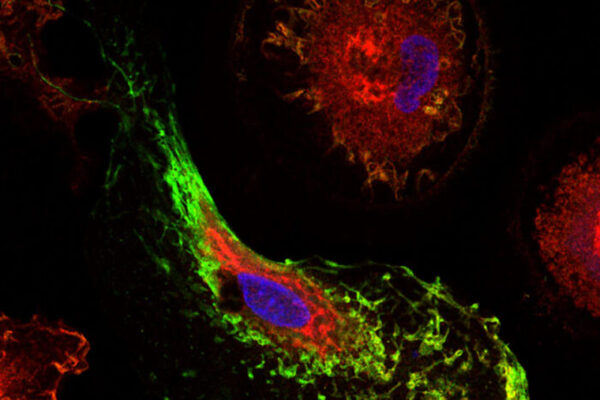Racial differences in Alzheimer’s research focus of $15 million grant
A new grant for research at the School of Medicine focuses on brain scans and other markers of Alzheimer’s. The aim is to establish whether early markers of disease in white populations also apply to African Americans.
Older people with early, asymptomatic Alzheimer’s at risk of falls
Older people without cognitive problems who experience a fall may have undetected neurodegeneration in their brains that puts them at high risk of developing Alzheimer’s dementia, according to a study from Washington University School of Medicine.
Alzheimer’s protein in blood indicates early brain changes
Researchers at Washington University School of Medicine have shown that levels of a specific protein in the blood rise as amyloid plaques form in the brain. The discovery could pave the way toward a blood-based test to diagnose Alzheimer’s disease before symptoms appear.
Insight into Alzheimer’s early stages provides clues to treatment strategies
Lack of sleep could help promote the development of Alzheimer’s disease, according to two studies from Washington University School of Medicine in St. Louis. The studies could help identify people at high risk of developing Alzheimer’s dementia and point to strategies for prevention.
Investigational drugs didn’t slow memory loss, cognitive decline in rare, inherited Alzheimer’s, initial analysis indicates
The School of Medicine led an international trial evaluating whether investigational drugs could slow memory loss and cognitive decline in a rare, inherited form of Alzheimer’s disease. The trial was conducted at 24 sites in Australia, Canada, France, Spain, the United Kingdom and the United States.
Gene ID’d as potential therapeutic target for dementia in Parkinson’s
Researchers at the School of Medicine have discovered that the genetic variant APOE4 – long linked to dementia – spurs the spread of harmful clumps of Parkinson’s proteins through the brain. The findings suggest that therapies that target APOE might reduce the risk of dementia for people with Parkinson’s disease.
$29 million for new phase of international Alzheimer’s study
School of Medicine researchers have received $29 million from the National Institute on Aging of the National Institutes of Health to continue a long-running, international Alzheimer’s study aimed at understanding how the disease develops and progresses.
Dementia patients’ adult kids diagnosed earlier than their parents
A new School of Medicine study indicates that people with dementia — whose parents also had dementia — develop symptoms an average of six years earlier than their parents.
Targeting immune cells may be potential therapy for Alzheimer’s
A School of Medicine study has found that brain immune cells called microglia form the crucial link between protein clumping and brain damage. Suppressing such cells might prevent or delay the onset of dementia in people.
Genes linked to Alzheimer’s risk, resilience ID’d
A team led by researchers at the School of Medicine in St. Louis has identified a pair of genes that influence risk for Alzheimer’s disease. The genes — known as MS4A4A and TREM2 — affect the brain’s immune cells. They influence Alzheimer’s risk by altering levels of TREM2, a protein that is believed to help microglia cells clear excessive amounts of the Alzheimer’s proteins amyloid and tau from the brain.
Older Stories









